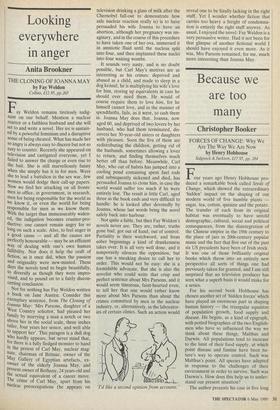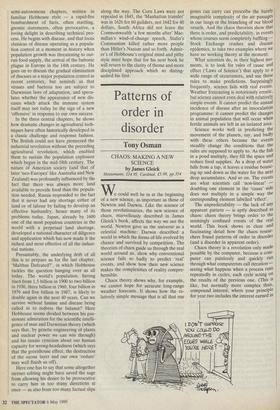Because we are too many
Christopher Booker
FORCES OF CHANGE: Why We Are The Way We Are Now by Henry Hobhouse
Sidgwick & Jackson, £17.95, pp. 264
Four years ago Henry Hobhouse pro- duced a remarkable book called Seeds of Change, which showed the extraordinary 'hidden' impact on the shaping of our modern world of five humble plants — sugar, tea, cotton, quinine and the potato. The transfer of each from its original habitat was eventually to have untold demographic, cultural, social and political consequences, from the disintegration of the Chinese empire in the 19th century to the place of jazz in 20th-century popular music and the fact that five out of the past six US presidents have been of Irish stock. It was one of those brilliantly original books which throw into an entirely new perspective all sorts of things one had previously taken for granted, and I am still surprised that no television producer has seen what a superb basis it would make for a series.
For his second book Hobhouse has chosen another set of 'hidden forces' which have played an enormous part in shaping human history — the triangular equation of population growth, food supply and disease. He begins, as a kind of epigraph, with potted biographies of the two English- men who have so influenced the way we think about these things, Malthus and Darwin. All populations tend to increase to the limit of their food supply, at which point disease and famine have been na- ture's way to operate control. Such was Malthus's point. All species have adapted in response to the challenges of their environment in order to survive. Such was Darwin's. How does this help us to under- stand our present situation?
The author presents his case in five long semi-autonomous chapters, written in familiar Hobhouse style — a rapid-fire bombardment of facts, often startling, gnomic statements, often provocative, a loving delight in describing technical pro- cess. He begins with disease, and that locus classicus of disease operating as a popula- tion control at a moment in history when population growth was threatening to out- run food supply, the arrival of the bubonic plague in Europe in the 14th century. He goes on to discuss the gradual elimination of diseases as a major population control in recent centuries, but reminds us that viruses and bacteria too are subject to Darwinian laws of adaptation, and specu- lates whether the appearance of new dis- eases which attack the immune system itself may not today be the sign of a new 'offensive' in response to our own success.
In the three central chapters, he shows how dramatic changes in agricultural tech- niques have often historically developed in a classic challenge and response fashion. The British could not have pioneered the industrial revolution without the preceding agricultural revolution, which enabled them to sustain the population explosion which began in the mid-18th century. The nature of American society (and that of later 'neo-Europes' like Australia and New Zealand) was profoundly influenced by the fact that there was always more land available to provide food than the popula- tion needed. Russia responded to the fact that it never had any shortage either of land or of labour by failing to develop an effective husbandry, hence many of its problems today. Japan, already by 1600 one of the most populous countries in the world with a perpetual land shortage, developed a national character of diligence and application which has now made it the richest and most effective of all the indust- rial nations.
Presumably, the underlying drift of all this is to prepare us for the last chapter, 'Malthus Defeated?', in which Hobhouse tackles the question hanging over us all today. The world's population, having risen from 1.5 billion in 1900 to two billion in 1930, three billion in 1960, four billion in 1976 and five billion in 1987, is likely to double again in the next 40 years. Can we survive without famine and disease being called in to redress the balance? Here Hobhouse seems divided between his pas- sionate admiration for the scientific intelli- gence of man and Darwinian theory (which says that, by genetic engineering of plants and nuclear power we can win through) and his innate cynicism about our human capacity for wrong-headedness (which says that the greenhouse effect, the destruction of the ozone layer and our own 'ordure' may well finish us off).
Here one has to say that some altogether sterner editing might have saved the sage from allowing his desire to be provocative to carry him in too many directions at once — as also from too many factual slips
along the way. The Corn Laws were not repealed in 1845, the 'Manhattan transfer' was in 1626 for 60 guilders, not 1642 for 40 dollars, South Africa did not leave the Commonwealth 'a few months after' Mac- millan's wind-of-change speech, Stalin's Communism killed rather more people than Hitler's Nazism and so forth. Admir- er's of Hobhouse's.original mind and pithy style must hope that for his next book he will return to the clarity of theme and more disciplined approach which so disting- uished his first.



















































 Previous page
Previous page